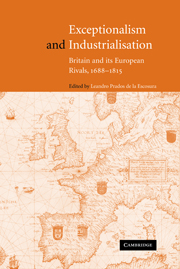Book contents
- Frontmatter
- Contents
- List of tables and figures
- List of contributors
- Acknowledgements
- Introduction: Was British industrialisation exceptional?
- Part I The origins of British primacy
- Part II Agriculture and industrialisation
- Part III Technological change
- Part IV Institutions and growth
- Part V War and Hegemony
- Conclusions
- References
- Index
Introduction: Was British industrialisation exceptional?
Published online by Cambridge University Press: 04 December 2009
- Frontmatter
- Contents
- List of tables and figures
- List of contributors
- Acknowledgements
- Introduction: Was British industrialisation exceptional?
- Part I The origins of British primacy
- Part II Agriculture and industrialisation
- Part III Technological change
- Part IV Institutions and growth
- Part V War and Hegemony
- Conclusions
- References
- Index
Summary
Between 1688 and 1815 Great Britain entered into sustained competition with its European rivals while simultaneously initiating an irreversible process of economic modernisation known as the Industrial Revolution. At the time of the Treaty of Vienna, Britain had achieved a hegemonic position in terms of naval power, international commerce, agricultural efficiency, industrial production, fiscal capacity and advanced technology. In 1820 the British enjoyed the highest per capita income in Europe (one-third higher than the French and one-fifth more than the Dutch) and its primacy persisted down to 1914 (Prados de la Escosura, 2000).
For more than a century the British Industrial Revolution has been perceived, in Max Hartwell's (1971) words, as one of the great discontinuities in history. It exhibited fast growth rates for aggregate economic activity that stemmed from increasing rates of capital formation, but above all from technological innovation (Feinstein, 1978). As depicted by David Landes (1969), British industrialisation was the paradigm for modern economic growth, so the diffusion of its best practice techniques of production and institutions became the yardstick for the assessment of the success or failure of subsequent national development.
The last two decades have witnessed a systematic challenge to the British paradigm. Nowadays, the idea of industrialised Britain's superiority above other regions of Europe based on more efficient institutions, cultural values and economic performance is seriously questioned.
- Type
- Chapter
- Information
- Exceptionalism and IndustrialisationBritain and its European Rivals, 1688–1815, pp. 1 - 12Publisher: Cambridge University PressPrint publication year: 2004
- 1
- Cited by

